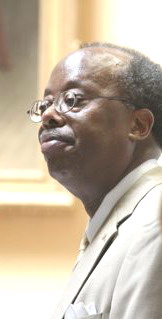Child support administrators make progress on reforms
By Ilana Kowarski
[email protected]
 Within the past few months, the Department of Human Resources has made significant progress in resolving the issues raised by the Office of Legislative Audits concerning their Child Support Enforcement Administration.
Within the past few months, the Department of Human Resources has made significant progress in resolving the issues raised by the Office of Legislative Audits concerning their Child Support Enforcement Administration.
The department has corrected seven of the 11 mistakes discovered by auditors during their evaluation of the child support system, and it is expected to remedy the final four problems by the end of April, according to the Office of Legislative Audits. The office released a 2011 report revealing that state authorities were not using all of the enforcement tools at their disposal to get parents to pay child support.
Now, however, the department has become more aggressive about collecting child support, and it has increased child support collections to a record high.
Senators call for final corrections
But until the corrections are certified by auditors, the department will not receive $100,000 of its 2013 appropriation.
At a Senate Health and Human Resources Subcommittee meeting last Friday, Human Resources Secretary Ted Dallas asked senators to stop withholding funds in recognition of his good faith effort to respond to auditors’ concerns, but committee members insisted that Dallas had to resolve all the audit findings before they would release funds to his department.
“I know you have your work cut out for you, and you’ve done a great job,” said Sen. James Robey, D- Howard Co., the subcommittee chair. Robey has repeatedly commended Dallas for taking the reins of a troubled agency, since the Department of Human Resources has a checkered history with auditors, and Dallas became department secretary after most of the violations occurred.
Robey emphasized that he understood that there were many obstacles to reform, but he asked Dallas to push harder for change.
“What we’d like to see you do is go to your people and take these folks by the collar, and say that they’ve got to fix things,” Robey said.
Audit found glaring problems
When Dallas took office in May 2011, the Child Support Enforcement Administration was riddled with problems, and these issues were documented in a September 2011 audit.
During the three-year period between September 2007 and October 2010, the audit found child support collectors made some major mistakes, including a lack of seizures from the bank accounts of parents refusing to pay child support and the insufficient withholding of these parents’ wages. Auditors also discovered inaccurate identification of non-custodial parents and the improper delivery of checks made out to dead custodial parents, which were occasionally fraudulently cashed.
It also became apparent that Baltimore City contractors were not complying with the terms of their state contract to collect child support and that they had failed to follow proper procedures in the majority of their collection cases.
Secretary overhauled child support system
Once Dallas became aware of these problems, he vowed to overhaul the child support system and enacted several initiatives for reform. Those included renegotiating contracts with collection agencies — which are now required to meet performance standards before they receive state funds — a policy change which was approved by the Board of Public Works two weeks ago.
Dallas also created a database of dead custodial parents in order to prevent fraud, and he established a new program intended to help non-custodial parents find work when they are unemployed and unable to pay child support.
Dallas’ approach has yielded financial dividends. His department collected $544 million in child support last year, a $25 million increase over the previous year and a new state record for child support collections.
McFadden still unhappy
Nevertheless, Dallas has his critics. Sen. Nathaniel McFadden, D-Baltimore City, believes that the secretary has relied too heavily on private contractors, especially in Baltimore.
“Just so you know, I’m still not happy,” McFadden said. “I think if you give the resources to state employees, they’ll do a better job. Private contractors do many things well, but in this case, the profit motive is a corrupting influence.”
In an emailed statement on March 5, Dallas wrote that he had finished addressing the 2011 audit findings and respectfully disagreed with those who say there is more work required to address them.
“The Department takes the findings of the legislative audit very seriously,” Dallas wrote. “We agreed with several of the recommendations and promptly took action to address them, and we believe that we now have successfully resolved all eleven audit findings.”

MarylandReporter.com is a daily news website produced by journalists committed to making state government as open, transparent, accountable and responsive as possible – in deed, not just in promise. We believe the people who pay for this government are entitled to have their money spent in an efficient and effective way, and that they are entitled to keep as much of their hard-earned dollars as they possibly can.


